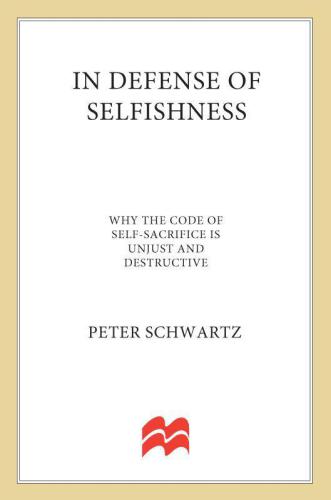
In Defense of Selfishness
Why the Code of Self-Sacrifice is Unjust and Destructive
کتاب های مرتبط
- اطلاعات
- نقد و بررسی
- دیدگاه کاربران
نقد و بررسی

March 15, 2015
Emphasizing the "I" in Selfishness. Ayn Rand Institute distinguished fellow Schwartz (The Foreign Policy of Self-Interest: A Moral Ideal for America, 2004, etc.) asserts loudly throughout this incendiary book that altruism "is ultimately a call for servitude," requiring that individuals "subjugate" themselves to others, "shackled to their needs. It is the demand, not that you respect other people's property-but that you become their property." Selfishness, on the other hand, is a virtue to be celebrated. "To be selfish," the author writes, "is to regard your life as something precious, as something to be passionately embraced, not self-effacingly surrendered. To be selfish is to strive to achieve the best that is possible to you. To be selfish is to remain loyal to your ideas." Selfishness protects what an individual has achieved, notably wealth. Schwartz finds ludicrous the notion that "it takes a village to make a billionaire"; self-made wealth, he insists, is no myth. "Public Interest," though, is a myth, a ploy by politicians (never mind that they have been elected by citizens) to force people to pay for what they don't want: national parks, arts funding, public housing, and even public schools. Value, in the author's eyes, is determined by the market. Surely, a profitable Disneyland better fulfills the public interest than the government-funded Yellowstone National Park. Schwartz condemns progressive education for teaching "that there are no objectively right and wrong answers" and for training children "to value the crowd over the self, conformity over independence, emotional solidarity over rational judgment." The author slyly uses the communism-tainted term "collective" rather than community, scorning collectivism that "takes the form of sacrificing 49 percent of the population to 51 percent." The collectivist approach to government, he writes, "regards man as an ineffectual, perpetually needy entity." For readers concerned with community, justice, and equality, this book is a real tear-jerker.

May 15, 2015
This thoughtful and well-reasoned essay will, for sure, evoke many spirited arguments on the altruism-versus-selfishness debate. A true scholar and avid proponent of Ayn Rand's ethics of rational self-interest (and author of The Foreign Policy of Self-Interest: A Moral Idea for America, 2004), Schwartz declares that the traditional negative view of selfishness is not only outmoded but also denigrating the very principles on which the U.S. was founded: the right of individuals to live honest, self-respecting, productive lives. With great care, he dissects case after case and news story upon news story. One example: kill the debate about immigrants entering American shores by offering them a home, without government support. The Ayn Rand philosophy, as to be expected, is referred to frequently; the notion of rational selfishness is defined as caring about one's own life. Yet to those seeking a higher purpose and to make a contribution to the world, altruism may be, in part, an honorable personal philosophy.(Reprinted with permission of Booklist, copyright 2015, American Library Association.)

























دیدگاه کاربران